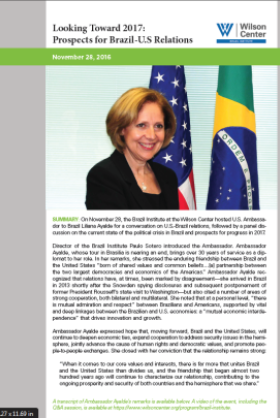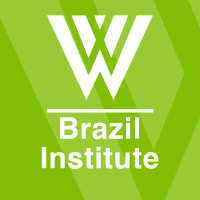Event Summary: Looking Toward 2017: Prospects for Brazil-U.S Relations and the Domestic Political Outlook for Brazil

On November 28, the Brazil Institute at the Wilson Center hosted U.S. Ambassador to Brazil Liliana Ayalde for a conversation on U.S.-Brazil relations, followed by a panel discussion on the current state of the political crisis in Brazil and prospects for progress in 2017.
Director of the Brazil Institute Paulo Sotero introduced the Ambassador. Ambassador Ayalde, whose tour in Brasilia is nearing an end, brings over 30 years of service as a diplomat to her role. In her remarks, she stressed the enduring friendship between Brazil and the United States “born of shared values and common beliefs…[a] partnership between the two largest democracies and economics of the Americas.” Ambassador Ayalde recognized that relations have, at times, been marked by disagreement—she arrived in Brazil in 2013 shortly after the Snowden spying disclosures and subsequent postponement of former President Rousseff’s state visit to Washington—but also cited a number of areas of strong cooperation, both bilateral and multilateral. She noted that at a personal level, “there is mutual admiration and respect” between Brazilians and Americans, supported by vital and deep linkages between the Brazilian and U.S. economies: a “mutual economic interdependence” that drives innovation and growth.
Ambassador Ayalde expressed hope that, moving forward, Brazil and the United States, will continue to deepen economic ties, expand cooperation to address security issues in the hemisphere, jointly advance the cause of human rights and democratic values, and promote people-to-people exchanges. She closed with her conviction that the relationship remains strong:
“When it comes to our core values and interests, there is far more that unites Brazil and the United States than divides us, and the friendship that began almost two hundred years ago will continue to characterize our relationship, contributing to the ongoing prosperity and security of both countries and the hemisphere that we share.”
Author
Explore More
Browse Insights & Analysis
Promoting Convergence in US-Brazil Relations

360° View of How Southeast Asia Can Attract More FDI in Chips and AI

Israel Escalates Attacks in Gaza: What’s Next?

